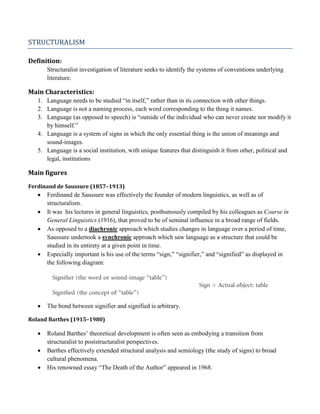Melden
Teilen
Downloaden Sie, um offline zu lesen

Empfohlen
Weitere ähnliche Inhalte
Was ist angesagt?
Was ist angesagt? (20)
Ähnlich wie Structuralism
Ähnlich wie Structuralism (20)
A study of the novel siddhartha from the perspective of intertextuality

A study of the novel siddhartha from the perspective of intertextuality
Bernard, H. Russell, ed.1998. Handbook of Methods in Cul.docx

Bernard, H. Russell, ed.1998. Handbook of Methods in Cul.docx
Structuralism
- 1. STRUCTURALISM Definition: Structuralist investigation of literature seeks to identify the systems of conventions underlying literature. Main Characteristics: 1. Language needs to be studied “in itself,” rather than in its connection with other things. 2. Language is not a naming process, each word corresponding to the thing it names. 3. Language (as opposed to speech) is “outside of the individual who can never create nor modify it by himself.” 4. Language is a system of signs in which the only essential thing is the union of meanings and sound-images. 5. Language is a social institution, with unique features that distinguish it from other, political and legal, institutions Main figures Ferdinand de Saussure (1857–1913) Ferdinand de Saussure was effectively the founder of modern linguistics, as well as of structuralism. It was his lectures in general linguistics, posthumously compiled by his colleagues as Course in General Linguistics (1916), that proved to be of seminal influence in a broad range of fields. As opposed to a diachronic approach which studies changes in language over a period of time, Saussure undertook a synchronic approach which saw language as a structure that could be studied in its entirety at a given point in time. Especially important is his use of the terms “sign,” “signifier,” and “signified” as displayed in the following diagram: The bond between signifier and signified is arbitrary. Roland Barthes (1915–1980) Roland Barthes’ theoretical development is often seen as embodying a transition from structuralist to poststructuralist perspectives. Barthes effectively extended structural analysis and semiology (the study of signs) to broad cultural phenomena. His renowned essay “The Death of the Author” appeared in 1968.
